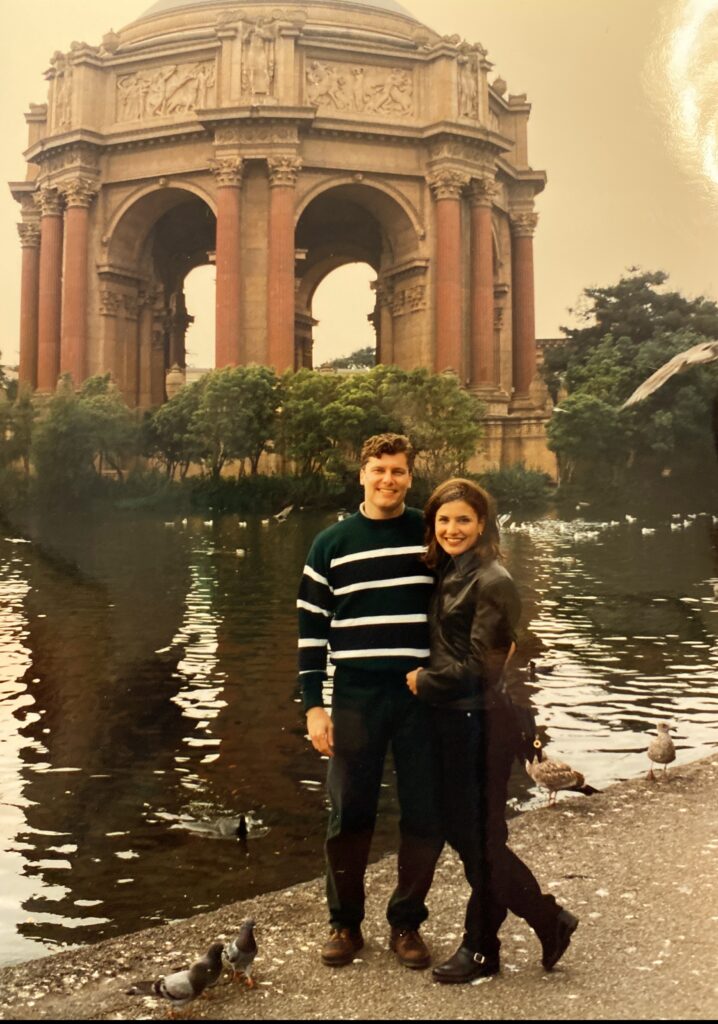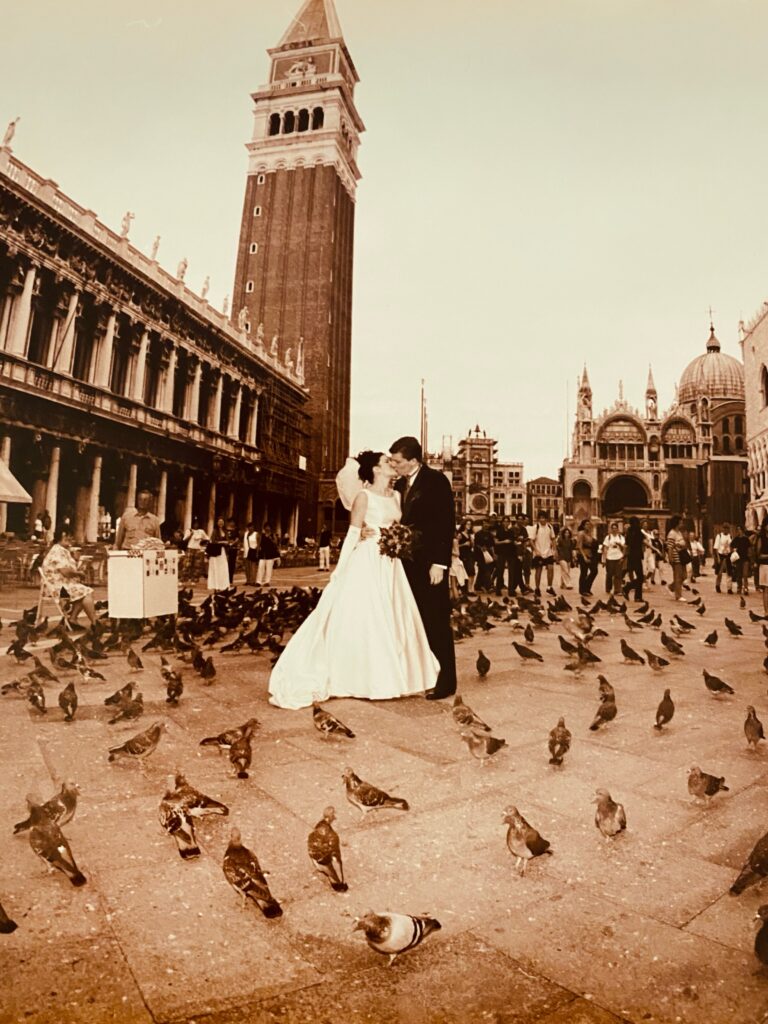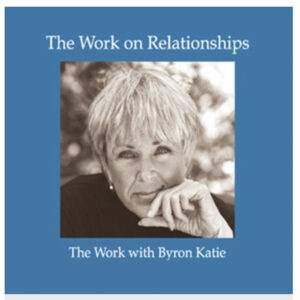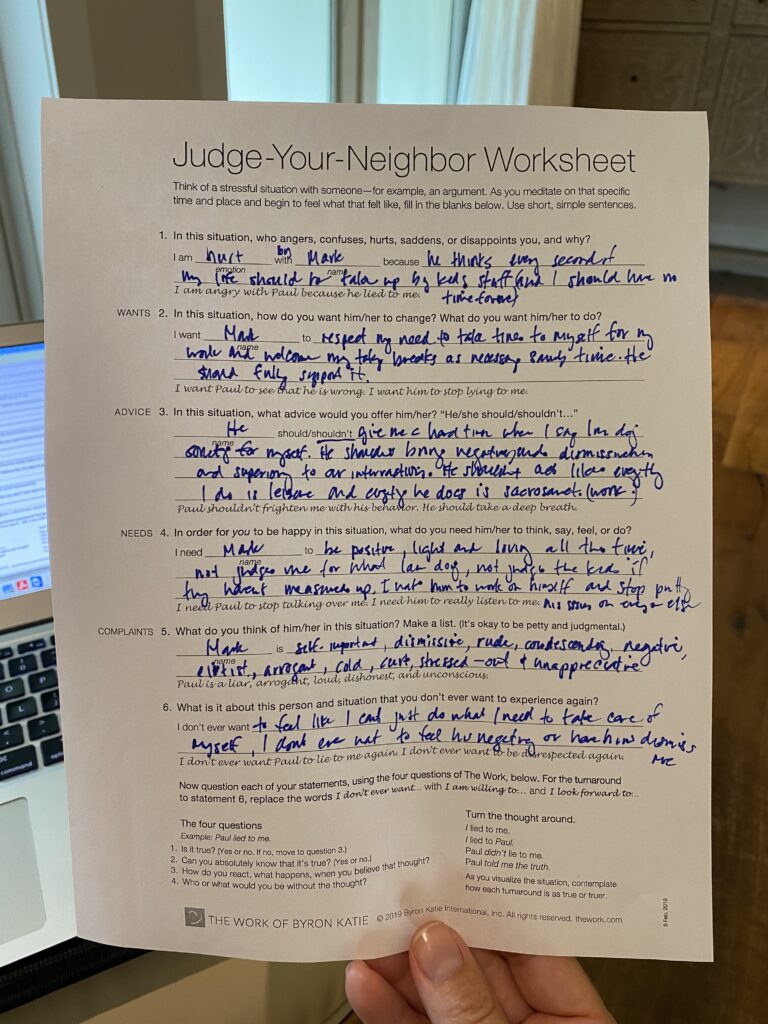
It’s an odd phenomenon when your kid hits a major milestone. Vivid pictures of that time in your own life run through your head.
Our firstborn is starting college college. It made me think of what it was like for me, the advice I got, and the wisdom I planned to impart on my own child.
We flew her across the country—Miami to Los Angeles—five hours direct. At her age, I also made a break for California—Chicago to Santa Barbara—chasing a better life out on my own. I couldn’t wait to be done with our family’s post-divorce chaos. My sendoff looked nothing like hers. And to that I say WHEW.
In the ramp up to closing the book on my childhood, I wasn’t checking off a list of college supplies. And my dad was not repacking luggage because he mistook my “definitely going” with my “still deciding” pile. No shade intended, that’s just not how our family did things.
Back in 1987, on the night before I boarded a plane to college, my top priority was one last epic night out at my favorite bar. My friend Julie and I planned to hit the dance floor until we shut the place down. The fact that I still had a box to pack and an early takeoff didn’t concern me in the least.

*this is not Julie, it’s my older sister. To protect the innocent, there are no photos of that night.
Julie and I skipped dinner to arrive early. We entered the dimly lit space, the odor of stale beer lingering in the air. Few patrons had beaten us there. We hopped on stools and greeted Hondo, the Hawaiian-shirt clad bartender, as he wiped down the counter.
“She’s going to college tomorrow!” Julie announced loud enough for the bouncer to hear, forgetting this admission could put our fake ID’s in question.
“Let’s get this girl a shot!” Hondo said with a smile, turning to the bottles behind him.
“Make it a double on me,” came a Southern drawl from the billiard room behind us.
I rotated my stool to catch the sly smile of some hot guy as he leaned across the pool table, the taught curve of bicep illuminated by the overhead tiffany lamp.
“Who the heck is that?” I asked Julie who made it her business to keep track of all available men in town.
“No idea but you should definitely thank him properly,” she said with a grin.
I slammed my shot and pushed off the bar.
“You’re coming,” I said. Julie saluted and followed me.
He swaggered over, chalking his pool cue.
“My name is Teedon, but you can call me Sweetness,” he said, stretching across the table to sink a ball in the side pocket.
Julie made friends with his brawny crew and I tossed back a few more tequilas with my cute new friend.
Club music rose and the bar filled to capacity. Teedon and I claimed our spot on the dance floor and became one gyrating unit, taking breaks only for more drinks. The early morning flight faded from my mind.
At whatever time, I grabbed for Julie’s shoulder and gestured to Teedon and the door, as in, I’ll be leaving with this stranger.
“Don’t do anything I wouldn’t do, missy!” she screamed from the dance floor after me.
At some ungodly hour, a phone rang in the distance. I lifted my head, peeling a moist cheek off Teedon’s bare chest.
“It’s your friend,” Teedon said, passing me the receiver.
“Liz, your dad called. You have no idea how many people I woke up to find you. You better get home,” Julie said, no trace of fun left in her urgent tone.
I jumped out of bed and hit my head on the loft, the receiver bouncing off the floor with a clatter.
“I have to leave,” I said, pulling on my skirt and stuffing my feet into sandals.
“Whatsa matter?” he asked, not moving.
“Dude, I need to get my ass home NOW,” I said.
“Slow down, cowgirl,” he said, picking up a pair of Levi’s off the floor. Denim flapped as he jumped into his pants.
On the way to the airport, still in my smokey bar clothes, I listened to my dad’s first fatherly speech of record.
“You have to live your life in moderation,” he said.
A smile crept across my lips. It did seem like good advice. In the years since, I have made the most of it.

As my husband unloaded luggage at the airport, Jane announced that she’d be sleeping the entire flight. Late bedtimes over the last few nervous days had taken a toll. She grumpily wondered aloud why the entire family was coming to LA. I told Jane my story (the PG version for the younger ears), explaining that a kid who has an involved family makes better choices than one who doesn’t. We have seen it in some of the kids’ friends and they all know my history. Her level headedness and good judgment far exceed mine at her age. My behavior during those years could have gotten me into serious trouble. As it was, showing up to the airport at the last minute, skidding into my seat meant that the luggage didn’t make it. My one outfit for sorority rush was a pair of pink shorty pajamas. Instant conversation starter to be sure, but less than ideal.
As for the advice, I passed on grandpa’s “live your life in moderation” speech because every college kid should tuck that one in, especially a social girl like mine (I have no idea where she gets it) who’s been cooped up with her meddling parents for 18 months straight. I threw in three additional reminders I thought might do my girl and anyone starting a new adventure some good:

- Remember who you are. That little person with big dreams who saw no limitations is still you. Speak sweetly into her ears. Anything you wouldn’t say to the little you, don’t say to your big self now. You are smart and capable. You are beautiful. You can do this. You deserve only encouragement. She will keep a childhood photo of herself up as a reminder.

- Remember what you can do. Starting a competitive program is intimidating for anyone, especially students who have been at the top of their class. Now everyone is a tippy topper. I gathered a few photos from Jane’s substantial highlight reel to post on her bulletin board. My favorite memories were the speeches her educators and coaches have given about her over the years. Her soccer Coach Biggee most of all.* Even if you weren’t cast as the lead during your first year at a new school like this kid, there is a superstar in each of us. Let her SHINE.

- Remember who loves you. Having three teenagers in the house is a whole different vibe than when they were little and played together like a pile of puppies. Occasionally, there are slammed doors, harsh words, and early departures from dinner. I gathered some shots from simpler times, when all three of my teens weren’t in full on age-appropriate individuation from their parents during a freaking pandemic. And she knows her dad and I love her beyond measure.

On move in day, I will leave a little gift for my girl: a self-care journal, Dr. Michael Brues’ Good Night, and a family photo of us skiing, i.e., the one remaining activity no one complains about doing together. I’ll also leave a bag for the roommates with some essentials, a little tape measure for each girl, a pair of scissors and a sage stick for each of them when the energy needs a scrub.

Is this everything she needs to know? I have no idea. Julie Lythcott-Haims sent us her book “How To Be An Adult” which should cover the rest.
I am super excited for her. Sometimes a deep sadness rises up and I sob to let it out. It’s usually at the first traffic light after I drop my youngest at school in the morning. I know my body will eventually realize we are in a new stage of parenting. And many friends who have been through this have offered encouraging words and an ear when I need it. All good.
When you do your very best to launch your kid into the big beautiful world with as many tools as you can stuff in her bag, you get the sense that it’s all going to be okay.
Love,
Elizabeth
WRITING PROMPT: How did your milestones shape you as a person? If you have kids, how were your milestones different from them?

* Coach Biggee didn’t understand why the third Heise kid (Finn) wasn’t given a “J” name. He fixed the obvious error by referring to them as Jane, Jackson and Jerome.
Do you follow these stories? If not, you are invited to subscribe at elizabethheise.com, check me out on the gram @elizabethheise1 and Twitter @heiseelizabeth1. Thanks for coming!








































